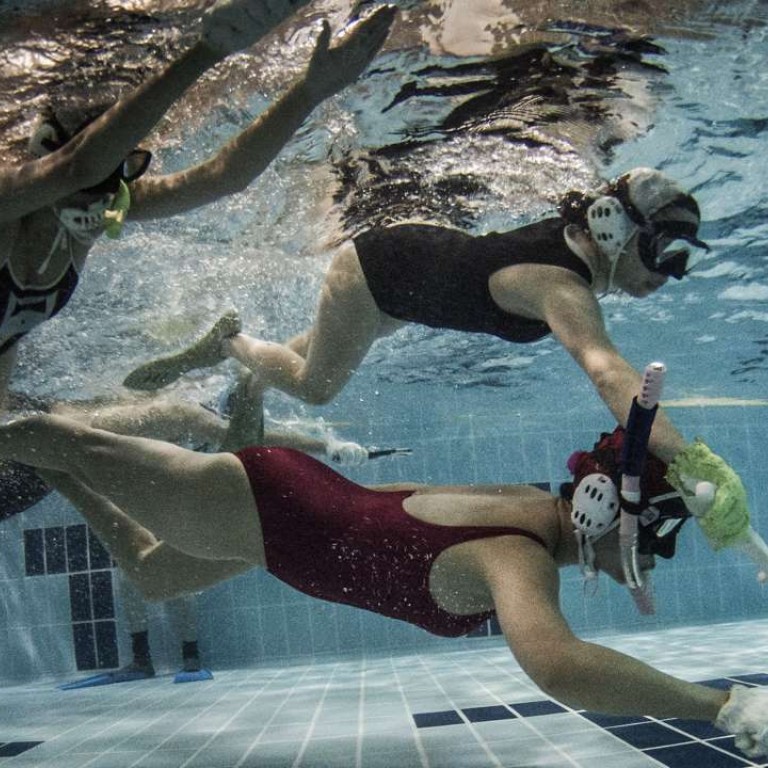
In at the deep end: Hong Kong’s underwater hockey players head for new waters
With the sport starting to take off, the city will field its first team in the China Cup tournament in Chengdu at the end of the month
It’s been described as something between squash and quidditch, the sport from the Harry Potter series where wizards fly broomsticks, and the fastest three-dimensional game in the world.
It’s hockey, but with a twist – it is played underwater – and its passionate following has developed to the stage that Hong Kong will field its first team in the China Cup underwater hockey tournament in Chengdu at the end of the month.
Invented by the British Navy in the 1950s as a winter game to keep scuba divers fit, the sport requires players to wear diving masks, fins, snorkels, and thick gloves while skilfully moving a lead puck with short bats across the bottom of a two- to four-metre-deep swimming pool and hitting it into the opposing goal. The game, consisting of two teams of six players, usually has two halves of 15 minutes and a half-time interval of three minutes.
The three-dimensional element comes as players move their bodies up and down, left and right, forwards and backwards in the water. They can flick and slide the puck with bats while taking turns for breath. Sometimes one player can flick the puck over a pool for another player to fetch it at the bottom.

Chan, a geologist who works for the government, grew up in Hong Kong as a competitive swimmer.
He learned to play underwater hockey when he studied geology in the United States, intrigued by a game where players still manage to work together as a team even though they cannot talk to each other underwater.
“If one [player] is up, two should be down to receive your puck and keep going – like a relay,” he says.
Chan says his group is likely the only underwater hockey club in town at the moment. Over the past decades, a few small clubs have organised random practises and trainings, but none of them managed to survive.
“Usually foreigners bring in the sport, but to my understanding they didn’t get into the local level. So when foreigners leave, the sport doesn’t have enough people to sustain.”
He says the association became more organised last year after he started getting requests from international players who were relocating to Hong Kong.
“I thought that was a good time to start, because we had enough experienced people, some locals, some enthusiastic people that could get going. So I started to get people together.
“We have top-level players from France, the Philippines, New Zealand, Great Britain ... [but] most of us are beginners. This is how it works in most of the teams in the world – more experienced people come here to teach us.”
You don’t have to be a fantastic lane swimmer. I hate lane swimming. I get bored
The group of local and expat players now meet for weekly training sessions at Island School pool in Mid-Levels, where they have been training for the China Cup.
According to Chan, the group has garnered more than 200 members online, 20 of whom are active players in the city. Normally, a dozen of them show up at a single practice.
The formalising of the community of underwater hockey players in Hong Kong coincides with the rapid growth of the sport in mainland China in recent years. In 2013, China had only three teams from Beijing, Shanghai, and Chengdu. This year, 16 teams from 12 Chinese cities, along with the Hong Kong team, will take part in the China Cup tournament.
The main challenge for the group has been finding a place to train.
If an underwater sport group needs to book a public swimming pool, it has to go through the Hong Kong Underwater Association (HKUA), a government-funded organisation governing the city’s underwater sports. However, its main focus is on promoting fin swimming, scuba diving, and skin diving, according to its website.
Although Chan’s group hasn’t been able to register with HKUA, it has gradually been recognised by other international teams, he says. And he has managed to book pools from schools, which is more expensive but offers more space for practice than crowded public pools.
Liz Sullivan will be among the players who represent Hong Kong this month after having been involved with the sport in Hong Kong for a number of years. She started playing underwater hockey as a 12-year-old in the United Kingdom, more than two decades ago.
When she and her husband Mark Sullivan, a player of underwater hockey for 21 years, arrived in town in 2009, they tried to set up a club but failed. After moving to Singapore in 2010 and playing underwater hockey there over the next two years, the Sullivans returned to Hong Kong but still couldn’t get the game going until Chan got involved.
Many of international players in Chan’s group have already known each other through club competitions before they came to play in the city.
“It’s a small community. Everybody knows everybody,” says Sullivan, who represents the UK in top-level underwater hockey tournaments.
Sullivan says underwater hockey is a sport for everybody – they just need to feel comfortable in water. She has coached people as young as five and as old as 70.
“[Since] it’s water based, if you got joint problems on your knees, ankles, anything like that, there is an element of stabilisation with it,”she says.
“You don’t have to be a fantastic lane swimmer. I hate lane swimming. I get bored.”

